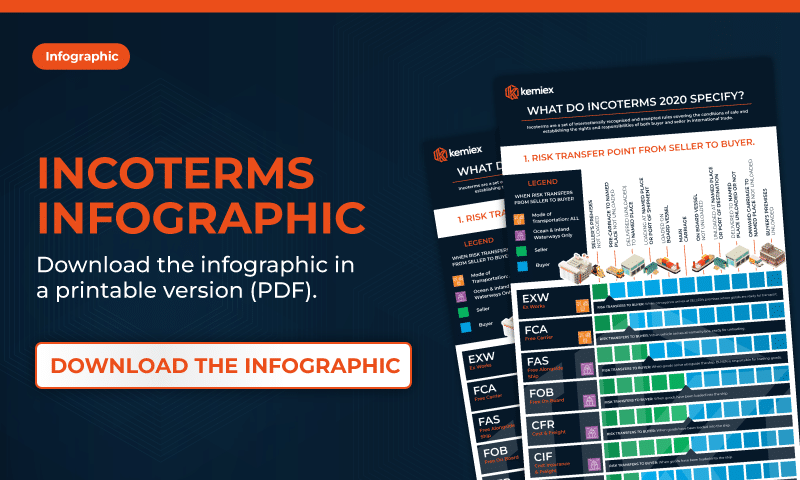
Incoterms explained - Guide plus Infographic
In the dynamic world of international trade, where goods traverse borders and encounter numerous obstacles, clarifying the point at which risks transfer from the seller to the buyer and understanding the responsibilities for costs is essential. This is where Incoterms, a set of internationally recognized rules, play a vital role in facilitating smooth transactions and establishing accountability between buyers and sellers.
Incoterms and Risk Transfer
One of the primary functions of Incoterms is to clearly define the point of risk transfer from the seller to the buyer. Incoterms specify at what stage the seller’s responsibility for the goods ceases and when the buyer assumes the risk.
By establishing this transfer point, Incoterms help to minimize disputes and ensure that both parties are aware of their obligations and liabilities throughout the transaction.
Incoterms and Responsibilities for Costs
Incoterms outline the responsibilities for costs associated with the services involved in international trade. These costs can encompass transportation, insurance, customs clearance, and other related expenses.
By clearly assigning these responsibilities to either the buyer or the seller, Incoterms establish a fair and transparent framework that enables effective negotiation and contract formation.
Universal Recognition and Acceptance
Incoterms are internationally recognized and accepted, providing a universal language for buyers and sellers from different countries to engage in commerce.
By using the same set of rules, parties involved in international trade can avoid misunderstandings and effectively navigate the complexities of cross-border transactions. This universal acceptance reinforces the importance of Incoterms as an indispensable tool for global commerce.
Continual Evolution of Incoterms
Incoterms have evolved over time to accommodate the changing dynamics of international trade. The International Chamber of Commerce (ICC) reviews and updates these terms periodically to reflect contemporary practices and address emerging challenges.
This commitment to staying current ensures that Incoterms remain relevant and effective in facilitating global trade.
Conclusion
Incoterms play a crucial role in international trade by clearly establishing the point of risk transfer from seller to buyer and defining the responsibilities for costs associated with services.
Their universal acceptance further reinforces their importance as an indispensable tool for global commerce.
As businesses continue to engage in cross-border trade, a thorough understanding of Incoterms is essential for navigating the complexities and ensuring successful transactions.
